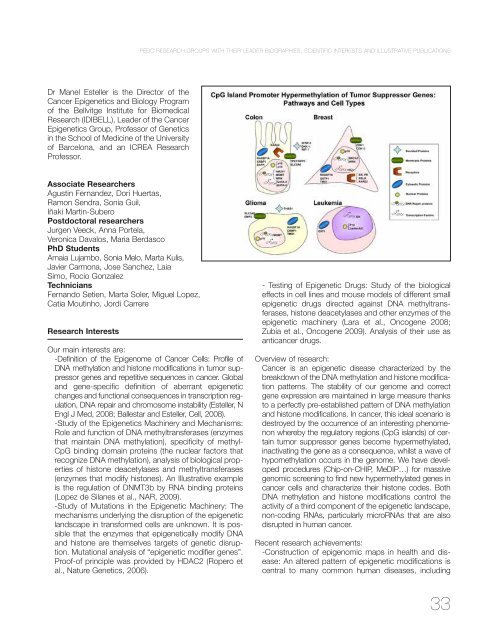PEBC Report - Programa de Epigenética y BiologÃa del Cáncer
PEBC Report - Programa de Epigenética y BiologÃa del Cáncer
PEBC Report - Programa de Epigenética y BiologÃa del Cáncer
Create successful ePaper yourself
Turn your PDF publications into a flip-book with our unique Google optimized e-Paper software.
<strong>PEBC</strong> RESEARCH GROUPS WITH THEIR LEADER BIOGRAPHIES, SCIENTIFIC INTERESTS AND ILLUSTRATIVE PUBLICATIONS<br />
Dr Manel Esteller is the Director of the<br />
Cancer Epigenetics and Biology Program<br />
of the Bellvitge Institute for Biomedical<br />
Research (IDIBELL), Lea<strong>de</strong>r of the Cancer<br />
Epigenetics Group, Professor of Genetics<br />
in the School of Medicine of the University<br />
of Barcelona, and an ICREA Research<br />
Professor.<br />
Associate Researchers<br />
Agustin Fernan<strong>de</strong>z, Dori Huertas,<br />
Ramon Sendra, Sonia Guil,<br />
Iñaki Martin-Subero<br />
Postdoctoral researchers<br />
Jurgen Veeck, Anna Portela,<br />
Veronica Davalos, Maria Berdasco<br />
PhD Stu<strong>de</strong>nts<br />
Amaia Lujambo, Sonia Melo, Marta Kulis,<br />
Javier Carmona, Jose Sanchez, Laia<br />
Simo, Rocio Gonzalez<br />
Technicians<br />
Fernando Setien, Marta Soler, Miguel Lopez,<br />
Catia Moutinho, Jordi Carrere<br />
Research Interests<br />
Our main interests are:<br />
-Definition of the Epigenome of Cancer Cells: Profile of<br />
DNA methylation and histone modifications in tumor suppressor<br />
genes and repetitive sequences in cancer. Global<br />
and gene-specific <strong>de</strong>finition of aberrant epigenetic<br />
changes and functional consequences in transcription regulation,<br />
DNA repair and chromosome instability (Esteller, N<br />
Engl J Med, 2008; Ballestar and Esteller, Cell, 2008).<br />
-Study of the Epigenetics Machinery and Mechanisms:<br />
Role and function of DNA methyltransferases (enzymes<br />
that maintain DNA methylation), specificity of methyl-<br />
CpG binding domain proteins (the nuclear factors that<br />
recognize DNA methylation), analysis of biological properties<br />
of histone <strong>de</strong>acetylases and methyltransferases<br />
(enzymes that modify histones). An Illustrative example<br />
is the regulation of DNMT3b by RNA binding proteins<br />
(Lopez <strong>de</strong> Silanes et al., NAR, 2009).<br />
-Study of Mutations in the Epigenetic Machinery: The<br />
mechanisms un<strong>de</strong>rlying the disruption of the epigenetic<br />
landscape in transformed cells are unknown. It is possible<br />
that the enzymes that epigenetically modify DNA<br />
and histone are themselves targets of genetic disruption.<br />
Mutational analysis of “epigenetic modifier genes”.<br />
Proof-of principle was provi<strong>de</strong>d by HDAC2 (Ropero et<br />
al., Nature Genetics, 2006).<br />
- Testing of Epigenetic Drugs: Study of the biological<br />
effects in cell lines and mouse mo<strong>de</strong>ls of different small<br />
epigenetic drugs directed against DNA methyltransferases,<br />
histone <strong>de</strong>acetylases and other enzymes of the<br />
epigenetic machinery (Lara et al., Oncogene 2008;<br />
Zubia et al., Oncogene 2009). Analysis of their use as<br />
anticancer drugs.<br />
Overview of research:<br />
Cancer is an epigenetic disease characterized by the<br />
breakdown of the DNA methylation and histone modification<br />
patterns. The stability of our genome and correct<br />
gene expression are maintained in large measure thanks<br />
to a perfectly pre-established pattern of DNA methylation<br />
and histone modifications. In cancer, this i<strong>de</strong>al scenario is<br />
<strong>de</strong>stroyed by the occurrence of an interesting phenomenon<br />
whereby the regulatory regions (CpG islands) of certain<br />
tumor suppressor genes become hypermethylated,<br />
inactivating the gene as a consequence, whilst a wave of<br />
hypomethylation occurs in the genome. We have <strong>de</strong>veloped<br />
procedures (Chip-on-CHIP, MeDIP…) for massive<br />
genomic screening to find new hypermethylated genes in<br />
cancer cells and characterize their histone co<strong>de</strong>s. Both<br />
DNA methylation and histone modifications control the<br />
activity of a third component of the epigenetic landscape,<br />
non-coding RNAs, particularly microRNAs that are also<br />
disrupted in human cancer.<br />
Recent research achievements:<br />
-Construction of epigenomic maps in health and disease:<br />
An altered pattern of epigenetic modifications is<br />
central to many common human diseases, including<br />
33


